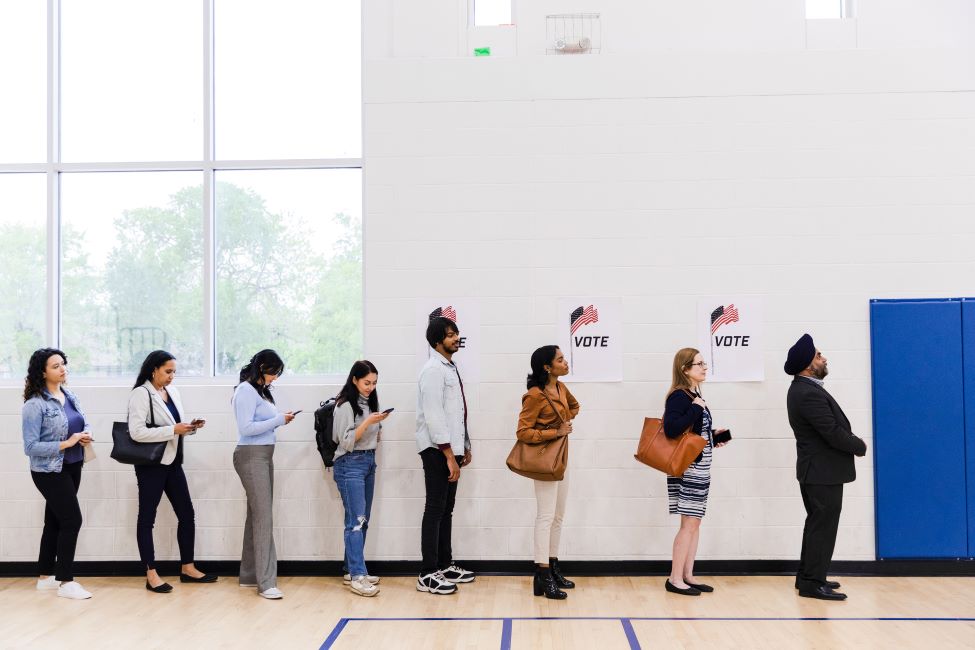FAU/Mainstreet Poll: Harris Edges Trump

Voters offer thoughts as they focus on Election Day
A new national poll from the Florida Atlantic University Political Communication and Public Opinion Research Lab (PolCom Lab) and Mainstreet Research USA shows U.S. Vice President Kamala Harris with a narrow lead over former U.S. President Donald Trump. The poll also uncovers complex voter attitudes toward democracy, economic policies, and the impact of celebrity endorsements.
Harris Leads in Tight Race, but Demographic Divides Persist
Harris leads Trump by a slim margin of 50% to 45% among likely voters. The race reveals stark demographic contrasts, with Harris commanding strong support from women (51%), voters over 50 (54%), and college-educated whites (54%). Trump, meanwhile, has an edge with younger voters (50% among 18-49) and white voters without college degrees (58%).
“The race remains extremely tight, with both candidates having strong bases of support,” said Kevin Wagner, Ph.D., professor of political science and co-director of the PolCom Lab. “The outcome may hinge on which campaign can better mobilize their core supporters and appeal to undecided voters.”
Voters Predict a Harris Victory
Voter expectation that Harris will emerge victorious is at 54%, while 46% predict a Trump win. Harris enjoys stronger confidence among her own supporters, with 97% of those planning to vote for her believing she will win. In contrast, 93% of Trump voters expect their candidate to prevail. Demographic breakdowns reveal notable differences:
- Women (57%) are more likely than men (53%) to predict a Harris victory
- Older voters aged 50 and above (58%) show greater faith in Harris’ chances compared to those under 50 (50%)
- Black voters overwhelmingly expect Harris to win (84%), while white voters without college degrees lean toward a Trump victory (57%)
- Hispanic voters strongly favor Harris’ chances (68%)
- Party affiliation plays a significant role, with 91% of Democrats forecasting a Harris win, compared to 86% of Republicans expecting Trump to triumph. Independents lean toward Harris, with 57% predicting her victory
“Asking people to predict the winner can give a sense of how people see their friends and family voting,” said Wagner. “This type of question can be a window on the political mood and suggests that Vice President Harris’ support continues to be enthusiastic and visible.”
The Taylor Swift Effect: Can Pop Power Boost Harris?
The poll explored the potential impact of pop superstar Taylor Swift’s endorsement of Harris. A majority of voters (58%) believe Swift's support will benefit Harris, with 25% saying it will strongly benefit her campaign and 33% expecting a slight boost. However, 32% of respondents believe the endorsement will have no real impact on the election outcome. Voters that believe that backing might benefit Trump instead is at 10%.
“The key value of the Swift endorsement may be in activating younger voters who might not have otherwise voted,” said Luzmarina Garcia Ph.D., an assistant professor of political science. “Celebrity endorsements can increase engagement in and visibility of elections, although it is not clear if endorsements persuade voters. However, Swift’s message has led to hundreds of thousands of visitors to the vote.gov website via her unique link.”
Economic Uncertainty Looms Large as Tariff Debate Continues
When asked about economic policies, particularly tariffs on foreign goods, the survey unveiled mixed opinions. Nearly half of voters, 49%, believe that tariffs will lead to higher prices for consumers, reflecting concerns over inflation and cost-of-living pressures. Meanwhile, 20% of respondents think the costs will be absorbed by foreign countries that export goods to the U.S. Another 9% of voters expect no significant effect from the tariffs, while 22% admit they are unsure of the potential consequences.
“These results highlight the complexity of voter attitudes toward both democratic institutions and economic policies,” said Dukhong Kim, Ph.D., associate professor of political science at FAU. “There’s a clear divide in how people perceive the health of our democracy, and similar uncertainty surrounds key economic measures like tariffs. As we approach the election, candidates will need to address these concerns to win over the remaining undecided voters.”
Democracy on the Line: Voters Split on America’s Future
The survey also revealed nuanced opinions regarding the state of democracy in the U.S., with 48% of respondents reported being either very or somewhat satisfied with how democracy is functioning. On the other hand, 35% expressed varying degrees of dissatisfaction with democratic institutions, while 17% of voters indicated they were neither satisfied nor dissatisfied. These figures suggest that, while a significant portion of the electorate remains content with the state of democracy, there is a growing faction that feels disillusioned or indifferent toward the system.
The Battle for Ballots: Mail-in Voting, Early In-Person, or Election Day
The poll reveals diverse voting preferences among different demographic groups for the upcoming November election. Overall, 40% of voters plan to cast their ballots on Election Day, while 29% intend to vote by mail, and 27% prefer early in-person voting. A small portion (3%) remain undecided about their voting method. Women are slightly more likely than men to opt for early in-person voting (29% vs. 25%), while younger voters (18-49) show a stronger preference for Election Day voting (46%) compared to older voters (37%). Black voters have the highest preference for early in-person voting (37%), and college-educated white voters are more inclined to vote by mail (33.2%) than their non-college-educated counterparts (26%). Notably, voting method preferences align strongly with candidate support. Among mail-in voters, Harris leads significantly (38% vs. 19% for Trump), while Trump holds a substantial advantage among Election Day voters (50% vs. 31% for Harris).
“These differences in voting method preferences between Harris and Trump supporters underscore the potential impact of election administration decisions on the final outcome. Among voters planning to vote by mail, Harris holds a decisive advantage, while Trump leads among those voting on election day,” said Wagner.
Contentment Amidst Chaos
Despite the contentious political landscape, the poll found that many Americans maintain a relatively positive outlook on their personal well-being. A majority of voters (61%) reported being very or somewhat happy with their lives, with only 20% indicating they are somewhat or very unhappy with their current circumstances. Older voters remain happier than younger voters, and Democratic voters (72%) are significantly happier than Republican voters (50%).
“In this election, we are seeing an upending of the old adage that predicts voting tendency by age, and instead see that happy people are leaning Democratic and unhappy voters are leaning Republican,” said Carol Bishop Mills, Ph.D., professor of communication and co-director of the PolCom Lab. “Interestingly, we’ve seen each party double-down on their respective messaging of either happiness or discontent, so they understand this dynamic.”
The analysis in this report is based on results of a survey conducted from Sept.16 to 17 among a sample of 820 registered voters living in the U.S. The survey was conducted using Interactive Voice Response and an online panel, with options to complete in English or Spanish. Weights were applied for gender, race, education and past vote. While a precise margin of error cannot be calculated due to the online component, a poll of this size would typically have a margin of error of +/-3.4% at the 95% confidence level. For full methodologies, visit www.faupolling.com/about .
-FAU-






